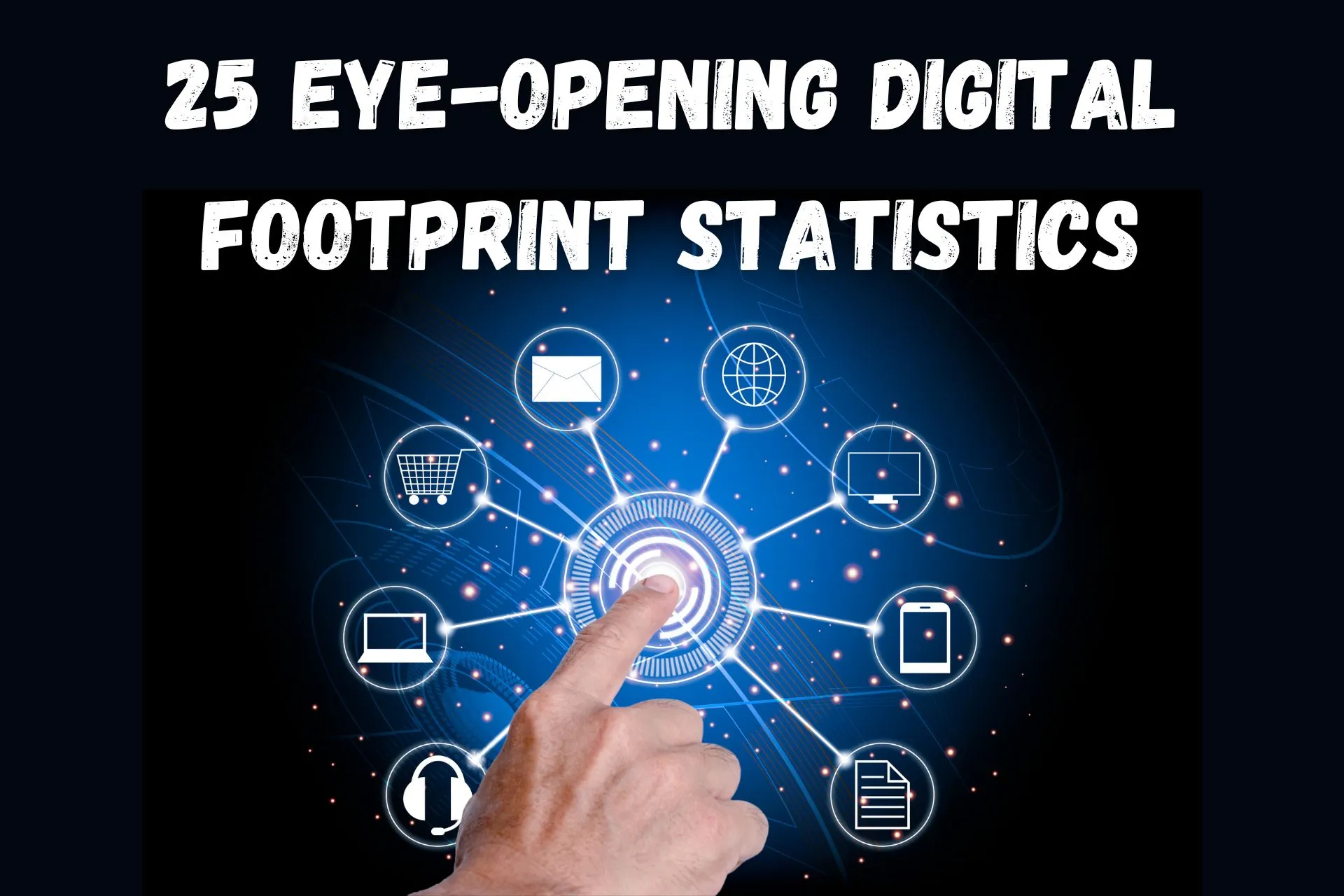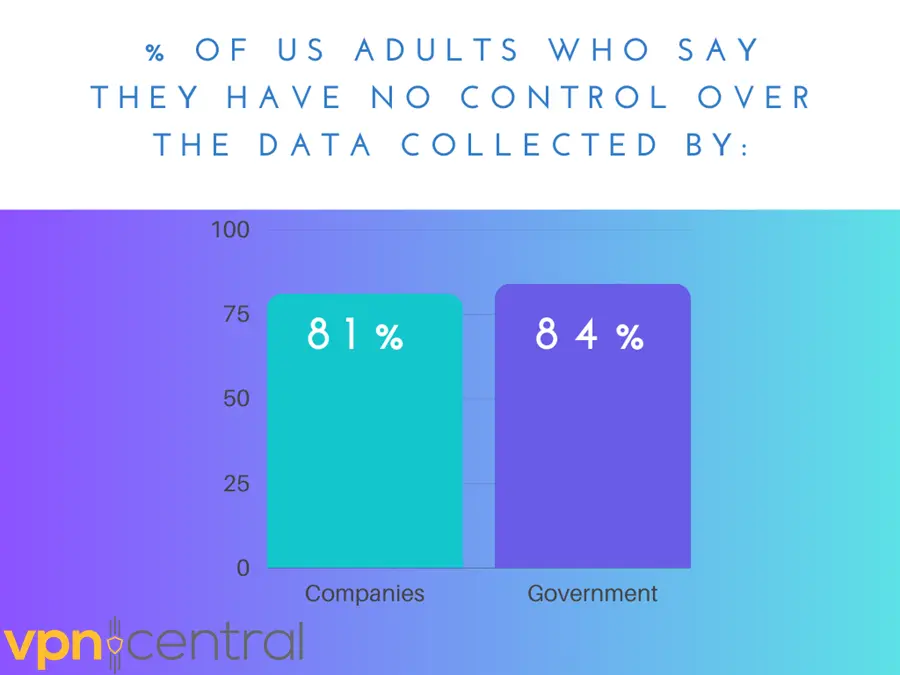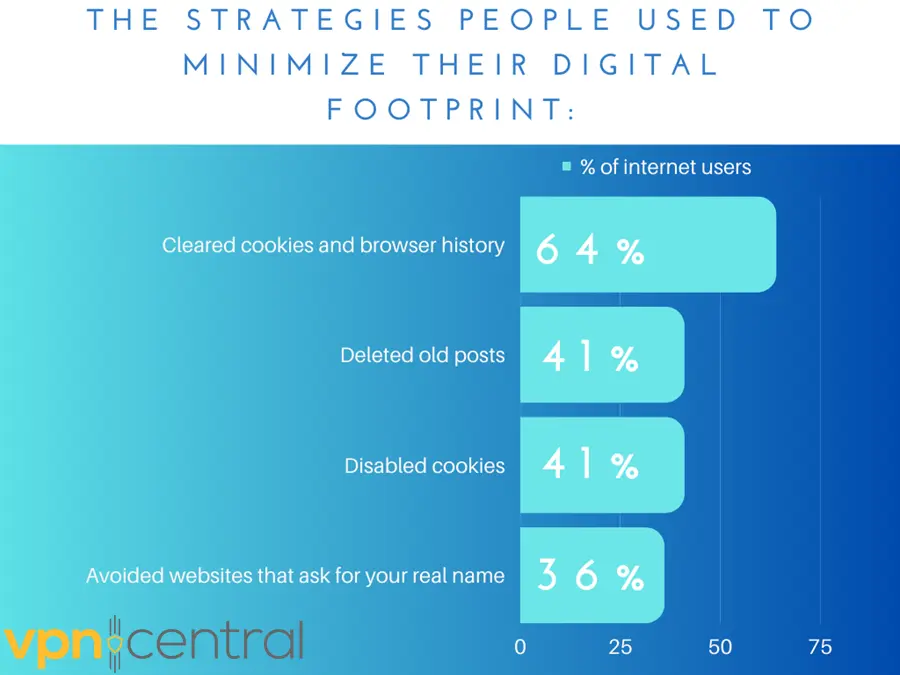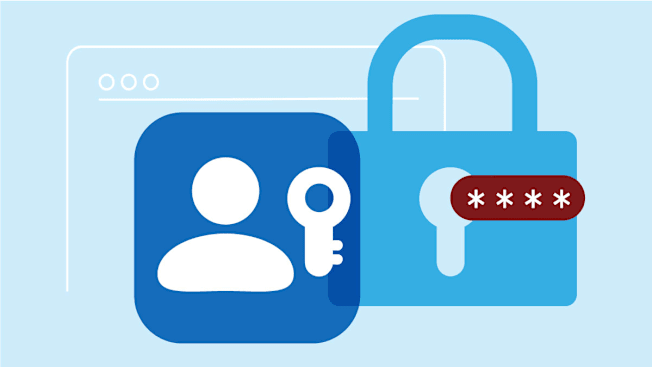25 Eye-Opening Digital Footprint Statistics to Know in 2025

Your digital footprint represents all the data and info you knowingly and unknowingly leave on the internet. It includes your social media and other web profiles, details you provide when registering for services, and other content you create and share.
It also includes your browsing habits, data on your devices, and sometimes, your location.
Digital footprint statistics show most people are aware that their info is online, but not necessarily how detailed or far back it goes. Privacy and security concerns are heightened when it can all be tied to your real person.
It’s never been more important to be aware of your digital footprint and mindful of what you make publicly available on the internet.
Let’s take a closer look at the most important digital footprint facts and stats.
Eye-opening digital footprint statistics for 2025
The facts below put the issue of digital footprints into perspective:
- 86% of Americans have attempted to remove aspects of their digital footprint.
- Up to 79% of Americans are concerned about companies breaching their online privacy.
- More than 500 companies in the US deal in selling mass user data from the web.
- The average person now has 7.6 active social media accounts.
- 50% of social media users still keep their profiles open and public.
- 15% of countries have zero laws and regulations about digital data protection.
- Mobile location data is a $16 billion industry.
General digital footprint facts and stats
More people are online, active for longer periods of time, and sharing more data, than ever before.
1. At least 60% of the global population uses the internet.
(Source: World Bank)

If more than half of the entire world uses the internet, that means upwards of 5 billion people have some form of digital footprint.
2. On average, internet users spend nearly 7 hours a day online.
(Source: GWI)
The average person spends 6 hours and 43 minutes online each day. Social media accounts for about 2.5 hours of that. That’s a lot of time spent growing your digital footprint.
3. The average person now has 7.6 active social media accounts.
(Source: Statista)
We all have a favorite that we spend the most time on, but the average person uses multiple social media platforms simultaneously.
Even if you limit the info you share on different profiles, your digital footprint encompasses everything, and many advertisers have access to it all.
4. Facebook remains the biggest social media platform.
(Source: Data Reportal)
With 2.934 billion monthly active users in October 2022, Facebook contributes the most to people’s social media footprints.
Selling your digital footprint
Although most of us have a negative view about our personal data being used and sold, it’s perfectly legal when certain rules and regulations are adhered to.
It’s also big business, but only in volume.
5. More than 500 companies in the US deal in selling mass user data from the web.
(Source: Privacy Rights Clearinghouse)
Using the definition from California and Vermont as a basis, it’s estimated there are 540 data brokers in the United States. The biggest use of data is in marketing, health, finance, and people search services.
6. Acxiom is the largest data broker in the world.
(Source: Acxiom)
Perhaps the most powerful company you’ve never heard of, Acxiom has profiles on over 2.5 billion people in 62 countries. That’s more than half the entire internet users on the planet. Even Facebook buys Acxiom data.
7. Acxiom uses up to 3,000 different data attributes.
(Source: Cracked Labs)
The company compiles up to 3,000 bits of information in its profiles. These include basic personal info, interests and hobbies, health status, finances, and political views. It can even tell advertisers whether someone in your household is planning to have a baby!
8. Up to 79% of Americans are concerned about companies collecting their data.
(Source: Pew Research)

The biggest concern is with private companies (79%), followed by government entities (64%). More than half of Americans (59%) say they understand very little or nothing about what organizations actually do with their data.
9. Your profile isn’t even worth a dollar.
(Source: Financial Times)
The more data attributes held about you, the more your profile is worth. However, an average individual profile on the data market is worth less than a dollar. The value comes in the volume of profiles and the ability to target specific groups.
10. Mobile location data is a $16 billion industry.
(Source: Grand View Research)
Many of us turn on our mobile device’s location service by default. After all, it helps us plan our journeys and is essential to the way a lot of helpful apps work. However, the collective data about where people go was estimated to be worth more than $16 billion in 2022.
11. You can monetize your own digital footprint.
(Source: Powr of You)
As public knowledge and concern about digital footprints grow, companies allowing you to monetize your own data are popping up. Such services let you earn commission on your online browsing, mobile, and social media activities.
Digital footprints and identity theft
Cybercriminals combine elements of your digital footprint on the surface web with compromised data to commit identity theft and other crimes.
According to remote work cybersecurity stats, 79% of companies believe they are even more vulnerable because of remote force.
12. 15 million Americans had their identity stolen in 2021.
(Source: Javelin Strategy, Experian)
Identity theft is on the rise, with 15 million cases in 2021 in the US alone. The crime is underreported, with only 1.4 million people complaining to the FTC for the same period.
13. Phone calls are still the leading criminal contact method, but the web causes more financial loss.
(Source: Experian)
646,440 identity theft reports to the FTC were related to phone calls, while internet-related complaints were slightly less at 640,372.
However, criminals using the internet caused total losses of $1.88 billion, compared to $699 million generated by phone scams.
14. A third of identity theft victims have a visible digital footprint on the surface web.
(Source: CIFAS)
Digital footprint statistics show that Identity theft isn’t just the result of hacks and data breaches. Personal data on the surface web can contribute to the overall knowledge held by criminals. What’s your mother’s maiden name? It might be on your Facebook.
Indeed, nearly a third of UK identity theft victims had an open digital footprint linked to their real identity. Moreover, 76% of victims who were company directors had their home address registered as their business address. This can be easily found online.
15. 98% of fraudsters create a new email account when using stolen card details.
(Source: SEON)
Although your digital footprint can lead to fraud, it can also help prevent it. For example, the vast majority of cybercriminals who have obtained stolen credit card information still don’t have access to the victim’s email account.
Instead, they create new accounts to register on online stores when making their fraudulent purchases.
By employing digital footprint analysis, these stores can determine that the new email address isn‘t linked to a digital footprint and may be a fraud attempt.
Laws and policies protecting your digital footprint
Believe it or not, there are many laws and regulations designed to protect your personal data. These mainly restrict the collection, use, and sharing of personal information with third parties without notice or consent.
16. 81% of Americans don’t feel in control of their data.
(Source: Pew Research)

Despite laws and regulations, the majority of Americans believe to have very little or no control over the data collected about them.
Indeed, how many of us really read privacy policies, know what websites do with cookie data, or actively petition search engines and data brokers for removal of information?
17. 15% of countries have zero laws and regulations for data protection.
(Source: United Nations)
137 out of 194 countries have some form of data protection legislation. Those that don’t include Venezuela, Afghanistan, Libya, Sudan, and Papua New Guinea.
18. European Union GDPR fines amount to hundreds of millions.
(Source: Tessian)
The European Union’s General Data Protection Regulation (GDPR) has been in place since 2018. In its first year, there were hundreds of millions in fines surrounding privacy and consent, and how information was managed, stored, and protected.
Amazon received the single biggest fine of €746 million in 2021 due to inadequate cookie consent policies.
19. 78% of US board directors worked towards GDPR compliance.
(Source: BDO)
GDPR has become the benchmark for international data protection. Any organization that operates within the EU must work toward compliance. In response, 78% of surveyed US company directors said their privacy notices were updated as early as 2018.
20. The US doesn’t have a single comprehensive federal data protection law.
(Source: Osano)
Data in the United States is governed under many different laws. The Federal Trade Commission (FTC) covers the broad strokes, such as businesses lying about how they handle data.
Some laws are sector-specific, such as the Health Insurance Portability and Accountability Act (HIPAA), which protects personal health information, and the Children’s Online Privacy Protection Act (COPPA), which protects children’s personal info online.
Only California, Colorado, Connecticut, Utah, and Virginia, have enacted comprehensive state laws, instead of the hundreds of smaller laws used in other states.
21. Google responded to half of the requests under the “right to be forgotten”.
(Source: Google)
The right to be forgotten is a 2014 EU policy that allows you to request removal of search results linking to incorrect, private, or harmful information about individuals. The US also adopted it in 2021.
Of more than 5 million requests so far, Google has successfully delisted 49.2% of problematic URLs.
Digital footprint stats and privacy habits
Concerns like identity theft and reputational damage are inspiring individuals to be more mindful of their digital footprint.
22. 54% of employers have rejected a candidate based on their social media profile.
(Source: Career Builder)
It’s no surprise people are concerned about their image online when more than half of employers are actively looking at social media profiles during the hiring process.
23. 86% of Americans have attempted to remove aspects of their digital footprint.
(Source: Pew Research)

Deleting cookies, encrypting email accounts, avoiding using real names, and using virtual private networks (VPNs), are some of the most common ways we try to protect our data.
24. Upwards of 1.2 billion people use VPNs.
(Source: Surfshark)
Estimates suggest 31% of all internet users may have used a VPN, which encrypts internet activity and prevents accurate web tracking.
25. 50% of social media users have set their profiles to private mode.
(Source: Viasat)
Of course, one solution to social media privacy concerns is to limit who can view your account. While this doesn’t prevent all data mining used by advertisers, it does prevent direct access to your posts.
10 Facts about Digital Footprint You Need to Know
Below are some facts you should be aware of to better understand the importance of digital footprint:
- All data on what you do online is stored in a remote area you never knew existed.
- Anything you search on Google leaves a trail of info.
- Traces you leave behind when using the internet can be searched or shared.
- You can do everything possible to delete your digital footprint, but it will stay online forever.
- When you visit a website, it can look up sites you were on before and track what you do next.
- Changing the privacy settings on your accounts can help protect you online.
- It’s a good idea to delete or disable all your inactive accounts.
- Negative digital footprint can impact your chances of getting hired.
- If a person posts something about you online, it becomes a part of your digital footprint.
- Googling your full name occasionally can be beneficial.
Read more:
Wrap up
As shown by these digital footprint statistics, nobody’s data is going away anytime soon.
However, as we become more aware of how others access, sell, and steal it, it might be time to reduce or hide our digital footprints.
FAQ
The digital footprint you leave at any point in your life can impact your reputation, relationships, and chances of getting hired or accepted to college. Cybercriminals can also use your data to hack into your accounts and steal your identity. This has happened to 15 million Americans in 2021. Lastly, large companies can collect your information to use for their own purposes
What is the importance of a digital footprint for students?
More colleges now read online profiles when deciding which applications they’re going to accept. What’s more, any tracks you leave online as a student will remain there forever. Students can also affect the digital footprints of others by posting information about them or tagging them in photos.
Employers and colleges may look at your digital footprint when you send an application. Similarly, anyone on the internet can look you up, including cybercriminals who may be after your identity. On a larger scale, various companies deal in selling mass user data collected online. Just in the US, there are over 500 of these data brokers. They sell this information to companies in marketing, health, finance, and people search fields.
While it’s impossible to delete trails you leave behind on the internet, there are things you can do to protect your info. For example, you can better adjust privacy settings on your account and delete or disable those you no longer use. Using a VPN when browsing the internet can help prevent accurate web tracking.
Sources
1. World Bank
2. GWI
3. Statista
5. Privacy Rights Clearinghouse
6. Acxiom
7. Cracked Labs
9. Pew Research
10. United Nations
11. Osano
12. Tessian
13. BDO
14. Google
15. Powr of You
17. CIFAS
18. Javelin Strategy
19. Experian
20. SEON
21. Career Builder
22. Pew Research
23. Surfshark
Read our disclosure page to find out how can you help VPNCentral sustain the editorial team Read more






User forum
0 messages